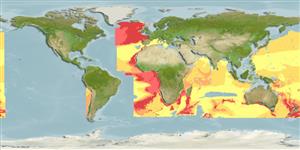Environment: milieu / climate zone / depth range / distribution range
Ekologi
laut batipelagis; kisaran kedalaman 50 - 2500 m (Ref. 4774). Deep-water; 64°N - 51°S, 77°W - 174°W (Ref. 1371)
Eastern Atlantic: Iceland and Faeroes to Cape Bojador, West Africa, and including Azores, Madeira, and western Mediterranean. Also known from the Walvis and Vavilov ridges (Ref. 45011). Reported from Mauritania (Ref. 55783). Western Indian Ocean: in the region south of Madagascar. Pacific Ocean: temperate Australia, New Zealand, and between Valparaiso, Chile and the Juan Fernandez Islands.
Length at first maturity / Size / Weight / umur
Maturity: Lm ?, range 34 - ? cm
Max length : 80.0 cm TL jantan/; (Ref. 9563); common length : 45.0 cm TL jantan/; (Ref. 9258)
deskripsi pendek
Kunci identifiaksi (pengenalan) | Morfologi | Morfometrik
Duri punggung (Keseluruhan (total)) : 0; duri punggung lunak (Keseluruhan (total)) : 54 - 59; Duri dubur: 0; Sirip dubur lunak: 18 - 21. Eyes relatively large, greater than snout length in diameter. Anal fin originating near midlength of body, deeply indented at midlength, sometimes appearing as two. Ventral light organ absent. Color is generally gray.
Recorded from the upper continental slope (Ref. 9563). Occasionally found at 50 m. Feeds on fishes, crustaceans, mollusks and other invertebrates as well as food of terrestrial origin, including garbage. Probably a winter and early spring spawner (Ref . 4774). Minimum depth from Ref. 106682.
Cohen, D.M., T. Inada, T. Iwamoto and N. Scialabba, 1990. FAO species catalogue. Vol. 10. Gadiform fishes of the world (Order Gadiformes). An annotated and illustrated catalogue of cods, hakes, grenadiers and other gadiform fishes known to date. FAO Fish. Synop. 125(10). Rome: FAO. 442 p. (Ref. 1371)
Status IUCN Red List (Ref. 130435: Version 2024-1)
ancaman kepada manusia
Harmless
penggunaan manusia
Perikanan: nilai komersial kecil
Alat, peralatan
laporan khas
muat turun XML
Sumber internet
Estimates based on models
Preferred temperature (Ref.
123201): 3.2 - 8.9, mean 5 °C (based on 1437 cells).
Phylogenetic diversity index (Ref.
82804): PD
50 = 1.0000 [Uniqueness, from 0.5 = low to 2.0 = high].
Bayesian length-weight: a=0.00603 (0.00451 - 0.00805), b=3.15 (3.07 - 3.23), in cm total length, based on LWR estimates for this species (Ref.
93245).
Trophic level (Ref.
69278): 3.8 ±0.55 se; based on food items.
Daya lenting (Ref.
120179): Rendah, Waktu penggandaan populasi minimum 4.5 - 14 tahun (Assuming tm>4).
Fishing Vulnerability (Ref.
59153): High to very high vulnerability (69 of 100).
Climate Vulnerability (Ref.
125649): Moderate vulnerability (38 of 100).
Nutrients (Ref.
124155): Calcium = 17.7 [5.5, 46.7] mg/100g; Iron = 0.283 [0.126, 0.817] mg/100g; Protein = 18.4 [16.5, 20.1] %; Omega3 = 0.184 [0.071, 0.470] g/100g; Selenium = 21.7 [7.4, 57.4] μg/100g; VitaminA = 18 [2, 134] μg/100g; Zinc = 0.439 [0.244, 0.868] mg/100g (wet weight); based on
nutrient studies.
